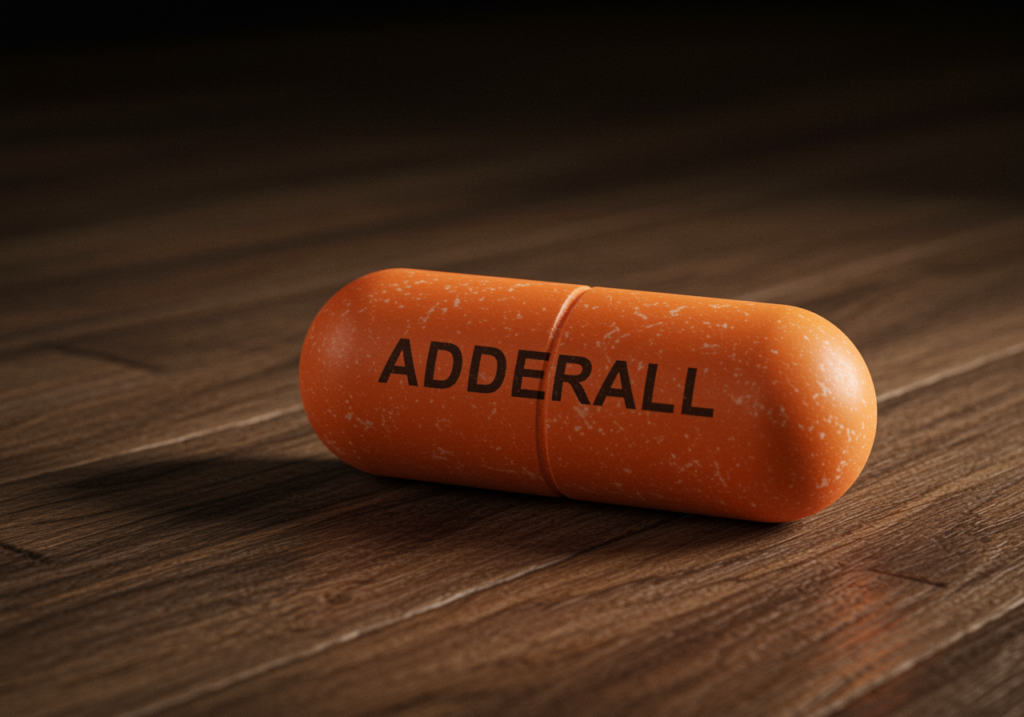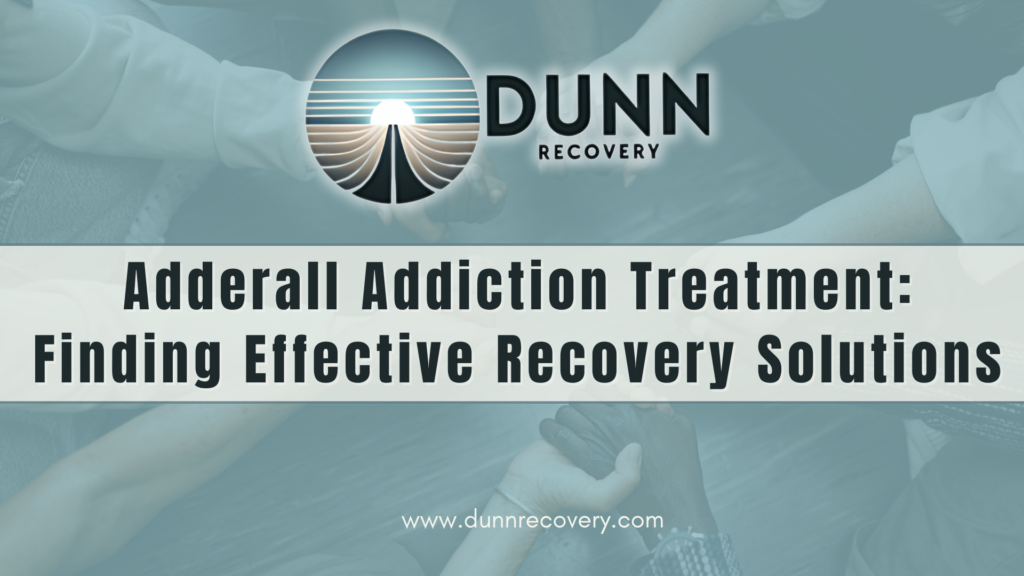The journey to overcoming Adderall addiction begins with understanding the available treatment options. For those struggling with dependence on this prescription stimulant, finding specialized adderall addiction treatment is crucial for successful recovery. At Dunn Recovery, we provide comprehensive care tailored to each individual’s unique needs, offering evidence-based approaches to help clients break free from addiction and rebuild their lives.
Understanding Adderall Addiction
Adderall, a prescription medication primarily used to treat ADHD and narcolepsy, contains amphetamine and dextroamphetamine, powerful stimulants that affect the central nervous system. Despite its therapeutic benefits when used as prescribed, Adderall carries significant potential for misuse and addiction.
The path to addiction often begins innocently. Many individuals start taking Adderall with a legitimate prescription for ADHD. Others may obtain it illegally, seeking enhanced focus, increased energy, or improved academic or professional performance. What begins as occasional use can quickly escalate into dependence as the brain adapts to the drug’s presence.
Adderall works by increasing dopamine levels in the brain, creating feelings of euphoria and heightened focus. With regular use, the brain’s natural dopamine production becomes suppressed, leading to a physical dependence where higher doses are needed to achieve the same effects.
The risk factors for developing an Adderall addiction include:
- Previous history of substance abuse
- Mental health conditions like depression or anxiety
- Family history of addiction
- Environmental stressors
- Starting use at a young age
Adderall Addiction Symptoms
Recognizing the signs of Adderall addiction is the first step toward seeking help. The symptoms can manifest in various ways, affecting physical health, behavior, and psychological well-being.
Physical symptoms include:
- Insomnia or disrupted sleep patterns
- Decreased appetite and weight loss
- Increased heart rate and blood pressure
- Excessive sweating
- Dry mouth
Behavioral changes may involve:
- Taking higher doses than prescribed
- “Doctor shopping” to obtain multiple prescriptions
- Spending significant time obtaining, using, or recovering from Adderall
- Continuing use despite negative consequences
- Neglecting responsibilities at work, school, or home
Psychological symptoms often present as:
- Intense cravings for the drug
- Anxiety or panic attacks
- Irritability and mood swings
- Paranoia or hostility
- Depression when not using
At Dunn Recovery, our experienced clinicians are trained to identify these symptoms and develop appropriate treatment plans to address both the addiction and its underlying causes.
Adderall Withdrawal: A Critical Phase in Recovery

When someone dependent on Adderall stops or reduces their use, withdrawal symptoms typically emerge. This challenging phase represents the body’s adjustment to functioning without the drug and can be both physically and emotionally taxing.
The withdrawal timeline varies depending on factors such as:
- Duration of Adderall use
- Typical dosage
- Individual metabolism
- Overall health
- Whether the cessation is sudden or gradual
Common withdrawal symptoms include:
- Extreme fatigue and increased sleep
- Depression and anhedonia (inability to feel pleasure)
- Increased appetite
- Cognitive impairment or “brain fog”
- Vivid, unpleasant dreams
- Strong cravings for Adderall
The acute withdrawal phase typically peaks within 2-4 days after the last dose and may last for several weeks. However, some individuals experience post-acute withdrawal syndrome (PAWS), where certain symptoms persist for months.
Due to the intensity of these symptoms and potential complications, attempting to quit Adderall without medical supervision can be dangerous. Dunn Recovery offers medically supervised detoxification services to ensure safety and comfort during this critical phase.
Long-Term Effects of Adderall
Understanding the potential long-term consequences of Adderall abuse reinforces the importance of seeking timely treatment. Extended misuse can lead to serious physical and psychological conditions that may persist even after discontinuation.
Cardiovascular effects:
- Hypertension (high blood pressure)
- Tachycardia (increased heart rate)
- Increased risk of heart attack or stroke
- Damage to blood vessels
Neurological impacts:
- Changes in brain structure and function
- Cognitive deficits affecting memory and attention
- Increased risk of seizures
- Development of movement disorders
Psychological consequences:
- Increased risk of developing anxiety disorders
- Clinical depression
- Psychosis or hallucinations
- Sleep disorders
Other potential long-term effects:
- Malnutrition due to appetite suppression
- Dental problems from dry mouth
- Skin issues
- Compromised immune system
At Dunn Recovery, our treatment approaches address both the immediate challenges of addiction and these potential long-term health concerns, offering comprehensive care that promotes total wellness and sustainable recovery.
Comprehensive Adderall Addiction Treatment Options
Effective adderall addiction treatment requires a multifaceted approach tailored to individual needs. Dunn Recovery offers various levels of care to support clients throughout their recovery journey.
Inpatient Adderall Treatment
For those with severe addiction or complex co-occurring disorders, inpatient treatment provides the most intensive level of care. This residential program offers:
- 24/7 medical supervision and support
- Structured daily schedules
- Removal from triggering environments
- Comprehensive therapy sessions
- Peer support in a community setting
Inpatient programs typically last 30-90 days, though the duration can be adjusted based on individual progress and needs. This immersive healing environment allows clients to focus entirely on recovery without external distractions or access to substances.
Dunn Recovery’s inpatient facilities feature comfortable accommodations, nutritious meals, recreational activities, and a supportive community of peers facing similar challenges. Our professional staff maintains a high standard of care while creating a nurturing environment conducive to healing.
Outpatient Adderall Treatment
For those with milder addiction or those transitioning from inpatient care, outpatient programs offer flexibility while providing essential treatment. Dunn Recovery offers several outpatient options:
Partial Hospitalization Programs (PHP):
- Typically 5-7 days per week
- 4-6 hours of treatment daily
- Clients return home each evening
- Comprehensive therapy and education
Intensive Outpatient Programs (IOP):
- 3-5 days per week
- 2-4 hours of treatment daily
- Allows for work or school attendance
- Focus on relapse prevention and life skills
Standard Outpatient Treatment:
- 1-2 sessions per week
- Maintenance therapy and support
- Ideal for long-term recovery maintenance
- Often includes regular drug testing
Outpatient programs enable clients to practice recovery skills in real-world settings while maintaining access to professional support and accountability.
Adderall Addiction Therapy Approaches
Effective treatment incorporates various therapeutic modalities to address the psychological aspects of addiction. At Dunn Recovery, we utilize evidence-based approaches including:
Cognitive Behavioral Therapy (CBT):
- Identifies and modifies harmful thought patterns
- Develops coping strategies for triggers and cravings
- Builds problem-solving skills
- Prevents relapse by changing behavioral responses
Dialectical Behavior Therapy (DBT):
- Enhances emotional regulation
- Improves interpersonal effectiveness
- Develops mindfulness practices
- Builds distress tolerance skills
Motivational Interviewing:
- Strengthens commitment to change
- Resolves ambivalence about recovery
- Client-centered approach
- Enhances intrinsic motivation
Group Therapy:
- Reduces isolation
- Provides peer feedback and support
- Offers different perspectives
- Creates accountability
- Repairs damaged relationships
- Educates family members about addiction
- Improves communication patterns
- Develops healthy family dynamics
These therapeutic approaches help clients understand the root causes of their addiction, develop essential coping mechanisms, and build a foundation for lasting recovery.
Medication-Assisted Treatment for Adderall Addiction
While there are no FDA-approved medications specifically for stimulant addiction, certain medications can help manage withdrawal symptoms and co-occurring disorders. Dunn Recovery’s medical team may prescribe:
- Antidepressants to address depression and anxiety
- Sleep aids to manage insomnia
- Mood stabilizers to reduce emotional volatility
- Non-addictive medications for concentration difficulties
The goal of medication management is to stabilize brain chemistry, reduce discomfort, and improve treatment engagement. All medications are carefully monitored, with the ultimate aim of helping clients achieve medication-free recovery when appropriate.
How to Quit Adderall: A Step-by-Step Approach

For those wondering how to quit Adderall safely, following a structured approach increases the chances of successful recovery:
- Consult with healthcare professionals: Never stop Adderall abruptly without medical guidance.
- Undergo proper assessment: A comprehensive evaluation helps determine the appropriate level of care.
- Develop a personalized treatment plan: Work with addiction specialists to create a plan addressing your specific needs.
- Consider a medically supervised taper: Gradually reducing the dosage minimizes withdrawal symptoms.
- Engage in therapy: Address the psychological aspects of addiction through regular counseling.
- Build a support network: Connect with others in recovery through support groups and community resources.
- Make lifestyle changes: Improve nutrition, exercise regularly, establish healthy sleep patterns, and develop stress management techniques.
- Create a relapse prevention plan: Identify triggers and develop strategies to manage high-risk situations.
- Establish accountability: Regular check-ins with treatment providers and supports help maintain recovery.
- Celebrate milestones: Acknowledge and reward progress to reinforce positive changes.
At Dunn Recovery, we guide clients through each of these steps, providing support and expertise throughout the journey.
Best Treatment for Adderall Addiction: Finding the Right Fit
The most effective adderall addiction treatment is one that aligns with an individual’s specific needs, preferences, and circumstances. Several factors should be considered when evaluating treatment options:
Severity of addiction: More severe cases typically require more intensive treatment approaches.
Co-occurring disorders: The presence of other mental health conditions necessitates dual diagnosis treatment.
Previous treatment experiences: What has or hasn’t worked in the past can inform current treatment decisions.
Personal responsibilities: Work, school, or family obligations may influence the feasibility of certain treatment models.
Support system: Strong family and social support can enhance the effectiveness of less intensive treatment options.
Individual preferences: Treatment that resonates with personal values and preferences typically yields better outcomes.
Dunn Recovery conducts thorough assessments to match clients with the optimal level of care and treatment approach. Our goal is to provide individualized treatment that addresses the whole person, not just the addiction.
Adderall Recovery Centers: What to Look For
When selecting an adderall recovery center, several key factors should be considered:
Accreditation and licensing: Ensure the facility meets industry standards and regulatory requirements.
Qualified staff: Look for certified addiction specialists, licensed therapists, and medical professionals.
Evidence-based approaches: The program should utilize treatment methods supported by scientific research.
Comprehensive services: Holistic care addressing physical, psychological, and social needs yields better outcomes.
Aftercare planning: Ongoing support following formal treatment is crucial for long-term success.
Insurance acceptance: Verify that your insurance is accepted to minimize out-of-pocket expenses.
Success rates: While recovery is highly individual, programs should be able to share general outcome data.
Dunn Recovery meets these critical criteria, offering accredited, evidence-based treatment delivered by qualified professionals in a supportive, healing environment.
Adderall Addiction Recovery Success Rates
Understanding adderall addiction recovery success rates can provide hope and realistic expectations. While individual outcomes vary considerably, research indicates:
- Approximately 40-60% of individuals in treatment for stimulant addiction achieve initial abstinence
- Of those who complete a comprehensive treatment program, about 50% maintain recovery for at least one year
- Success rates improve significantly with longer treatment duration and aftercare participation
- Multiple treatment episodes are common before achieving long-term recovery
- Recovery outcomes improve when co-occurring mental health conditions are effectively treated
At Dunn Recovery, we track outcome data while respecting client confidentiality. Our comprehensive approach—addressing psychological, physical, and social factors—aims to maximize recovery success for each individual we serve.
The Journey Beyond Treatment: Maintaining Long-Term Recovery
Recovery from Adderall addiction doesn’t end with formal treatment completion. Sustainable recovery requires ongoing commitment and support. Dunn Recovery’s aftercare planning includes:
Continuing care options:
- Regular outpatient therapy sessions
- Recovery coaching
- Alumni program participation
- Support group referrals
Relapse prevention strategies:
- Identifying and managing triggers
- Building healthy coping mechanisms
- Creating emergency response plans
- Regular self-assessment
Lifestyle adjustments:
- Developing healthy routines
- Building supportive relationships
- Engaging in meaningful activities
- Practicing stress management techniques
Addressing co-occurring issues:
- Ongoing mental health treatment
- Developing healthy sleep patterns
- Improving nutrition and physical activity
- Building emotional regulation skills
By addressing these aspects of long-term recovery, individuals can build fulfilling, substance-free lives following adderall addiction treatment.
FAQ: Adderall Addiction Treatment
What is the first step in seeking adderall addiction treatment?
The first step is acknowledging the problem and reaching out for professional help. Contact a healthcare provider, addiction specialist, or treatment center like Dunn Recovery for a comprehensive assessment. This evaluation will determine the appropriate level of care and treatment approach based on your specific situation and needs.
How long does adderall addiction treatment typically last?
The duration of adderall addiction treatment varies based on individual needs. Inpatient programs typically last 30-90 days, while outpatient treatment may continue for 3-12 months or longer. Many individuals benefit from ongoing aftercare for several years. At Dunn Recovery, treatment plans are personalized and adjusted based on progress and changing needs.
Does insurance cover adderall addiction treatment?
Most insurance plans provide some coverage for addiction treatment services. The specific coverage depends on your insurance provider and policy details. Dunn Recovery works with numerous insurance companies and can verify your benefits to determine coverage for our adderall rehab programs. We also offer various payment options for any out-of-pocket expenses.
What happens during detox from Adderall?
During medically supervised detox, patients are monitored as the drug leaves their system. Withdrawal symptoms typically include fatigue, depression, increased appetite, disturbed sleep, and intense cravings. Medical staff may provide supportive medications to manage these symptoms. At Dunn Recovery, our detox program ensures safety and comfort during this challenging phase.
Can I continue working or attending school during adderall addiction treatment?
This depends on the level of care needed. Inpatient treatment requires a temporary leave from work or school. However, outpatient programs are designed to accommodate these responsibilities. Dunn Recovery offers flexible scheduling for our intensive outpatient and standard outpatient programs, allowing clients to maintain their essential life commitments while receiving treatment.
How effective is adderall addiction treatment?
Research shows that comprehensive treatment approaches combining therapy, support groups, and, when appropriate, medication management can be highly effective. Success rates improve with longer treatment duration and aftercare participation. At Dunn Recovery, our integrated approach addresses all aspects of addiction, improving outcomes for lasting recovery.
What happens if I relapse after adderall addiction treatment?
Relapse is often part of the recovery process and doesn’t mean treatment has failed. If relapse occurs, it’s important to seek help promptly to prevent escalation. Dunn Recovery provides relapse-specific interventions, helping clients learn from the experience and strengthen their recovery skills. We view relapse as an opportunity for growth rather than failure.
Are there medications to help with Adderall addiction?
While there are no FDA-approved medications specifically for Adderall addiction, certain medications can help manage withdrawal symptoms and co-occurring conditions like depression or anxiety. Dunn Recovery’s medical team may prescribe appropriate medications as part of a comprehensive treatment plan, always with careful monitoring and the goal of supporting long-term recovery.
How do I support a loved one going through adderall addiction treatment?
Supporting a loved one involves educating yourself about addiction, participating in family therapy when appropriate, encouraging their treatment adherence, and caring for your own well-being. Dunn Recovery offers family programs and resources to help loved ones understand addiction and develop healthy supportive roles in the recovery process.
What makes adderall addiction treatment at Dunn Recovery different?
Dunn Recovery distinguishes itself through individualized treatment plans, evidence-based therapeutic approaches, qualified clinical staff, comprehensive services addressing all aspects of recovery, and strong aftercare support. Our holistic approach treats the whole person, not just the addiction, leading to more sustainable recovery outcomes and improved quality of life.
Conclusion: Hope and Healing Through Professional Treatment
Overcoming Adderall addiction is challenging but absolutely possible with the right support and treatment. At Dunn Recovery, we understand the complexities of stimulant addiction and offer comprehensive adderall addiction treatment designed to address the physical, psychological, and social aspects of recovery.
Our evidence-based approaches, compassionate staff, and commitment to individualized care create an environment where healing can flourish. Whether you’re seeking treatment for yourself or a loved one, taking that first step toward recovery is an act of courage that opens the door to a healthier, more fulfilling future.
Recovery isn’t just about stopping Adderall use—it’s about rebuilding a life of purpose, connection, and well-being. With professional treatment and ongoing support, this transformation is within reach. Contact Dunn Recovery today to learn more about our adderall addiction treatment options and begin your journey toward lasting recovery.

